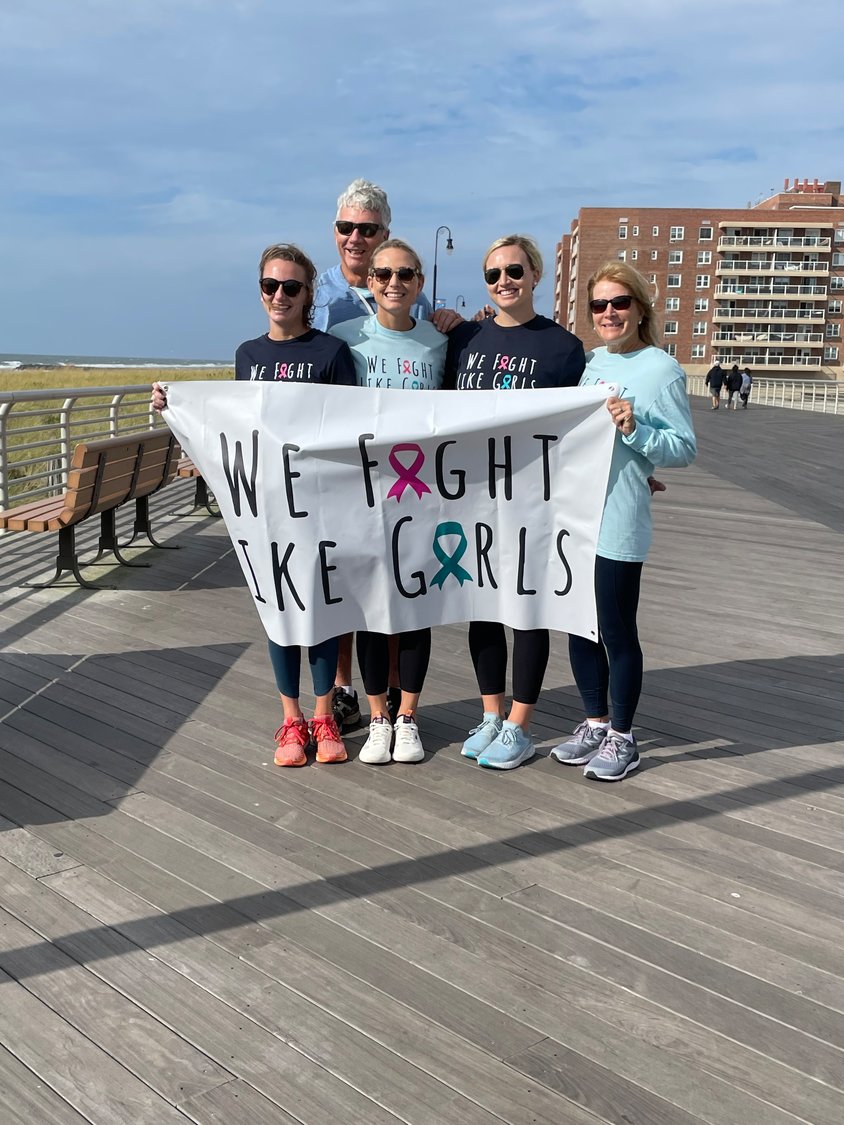Girls fight, cancer loses
Aptly named weekend fundraiser pulls in more than $65,000
In 2014, the Rix sisters Mikaela, now 28, and Marguerite, 26, both of Long Beach, were healthy, athletic and training to run the New York City Marathon.
Then the unthinkable happened.
In August 2018, Marguerite was diagnosed with ovarian cancer. Eight months later, Mikaela was stricken by breast cancer.
“I just thought I had had too much pizza,” Marguerite said, explaining that her only symptom was bloating before an exam that revealed her cancer. Mikaela felt a lump under her armpit. Her diagnosis, she said, “was shocking to hear.”
Both have undergone treatment and are now cancer-free. They fought then, they have not stopped fighting since, and in 2020, they started an organization, We Fight Like Girls.
Last Saturday, Mikaela, Marguerite and a third sister, Morgayne, who is cancer-free, led a parade of about 200 that began on Magnolia Boulevard in Long Beach. Another 100 people marched under the same banner in Rye, in Westchester County.
It was We Fight Like Girls’ second annual parade, which raised $70,000 the first time. At the latest count over the weekend, the sisters said $65,000 had been raised, and they believed they would top the first year’s total. The money will go to support the Foundation for Women’s Cancer and Memorial Sloan Kettering Cancer Center in New York.
The road from the dark days of diagnosis to the sunny weekend in Long Beach was long and difficult.
Mikaela studied finance and theology at Boston College, playing lacrosse there for four years and graduating in 2015. Marguerite attended Elon University in North Carolina, 201 studying education and psychology..
Mikaela now works on the trading desk at Morgan Stanley, the Manhattan financial giant. Marguerite is a counselor at Northport Middle School, in Suffolk County.
The sisters decided to hold their march in early October to coincide with Breast Cancer Awareness Month, when marches, rallies and fundraisers are held across the country.
Breast Cancer Awareness Month is a big deal on Long Island, where breast cancer rates are high. In Nassau, the rate is 1.1 percent above than the national average, according to a federal study.
On Sunday, about 45,000 breast cancer survivors and their supporters rallied at Jones Beach State Park to take part in the annual Making Strides Against Breast Cancer walk to raise awareness of the disease and money for treatment and research. Organizers said they were on track to raise about $1.7 million.
According to the American Cancer Society, breast cancer is the second-most common form of cancer in American women after skin cancers. The society said that a woman in the U.S. has a 12 percent, or 1 in 8, chance of developing breast cancer. Fundraisers are key to the fight against the disease, according to the organization.
The Rix sisters and their parents, Michael and JoEllen Rix, of Garden City, have long been puzzled because they said there is no family history of cancer. “We did genetic testing,” Marguerite said. “There was no [family] link. We don’t know what caused this.”
Initially, there was only shock. “I was a young adult,” Marguerite said after the Saturday march. Ovarian cancer in a 20-something woman is rare.
The sisters kept in good shape, they said, and they watched what they ate. But with the diagnosis, JoEllen said, there had to be a plan.
“These were two healthy young girls,” said JoEllen, who retired after a career in the advertising industry. “I was like, holy moly. It hits you like a ton of bricks.”
“But once a plan is in place, you know what to do,” she said. “It becomes like a job. It’s going for the chemo appointment or the doctor’s office. You either do that, or you can’t get out of bed.”
JoEllen said she is grateful for the support of family members, friends and neighbors. “It takes a village,” she said. “We couldn’t have gotten through this without them all.”
The catalyst for starting We Fight Like Girls came to the sisters during their joint recovery.
“Since we were both so young, we were in a unique position,” Mikaela said. “We had to make decisions” about treatment. They thought of other young people who might seek guidance, and wanted to help.
They both said they feel fortunate to have come through the experience.
“We’re really fortunate,” Marguerite said. “It’s given us a new lease on life. We want to put all our efforts” into We Fight Like Girls.

 50.0°,
Overcast
50.0°,
Overcast 




